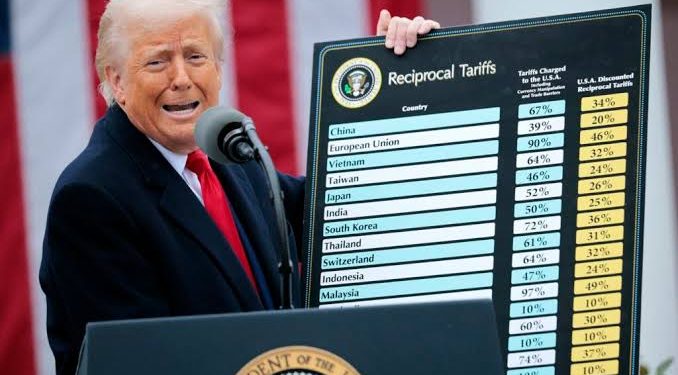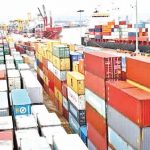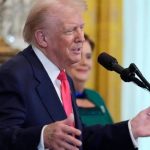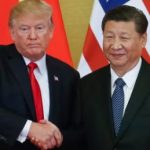In a dramatic overhaul of global trade policy, U.S. President Donald Trump has announced a sweeping 10% baseline tariff on all U.S. imports, alongside targeted reciprocal tariffs on countries that impose higher duties on American exports. Under the new policy, Nigerian goods exported to the U.S. will now face a 14% tariff, compared to the 27% rate the U.S. claims to encounter when exporting to Nigeria.
The announcement, delivered during a Rose Garden event dubbed “Liberation Day,” marks one of the most significant trade shifts in modern history, challenging the free-trade principles that have shaped global commerce since World War II. Trump described the move as the beginning of a new era of “fair trade,” emphasizing that the goal is to strengthen American industries, boost domestic production, and break down foreign trade barriers that he claims have disadvantaged U.S. businesses.
The tariffs, which take effect immediately, impact over 50 countries, including major economic powerhouses such as China, India, Japan, and the European Union, as well as developing markets in Africa, Asia, and Latin America.
According to data from Nigeria’s National Bureau of Statistics, trade between Nigeria and the U.S. amounted to N31.1 trillion between 2015 and 2024. During this period, Nigeria imported N16.4 trillion worth of goods from the U.S., while exports accounted for 8.7% of Nigeria’s total global trade. However, Nigeria’s trade with the U.S. has been on the decline, largely due to reduced crude oil purchases by American buyers.
The new tariff regime could further strain trade relations between both nations, as Nigerian exporters will now face higher costs when accessing the U.S. market. With crude oil historically making up a significant portion of Nigeria’s exports to the U.S., analysts warn that the added tariff could push Nigeria to diversify its trade partnerships further, strengthening ties with other regions such as the European Union, the United Kingdom, and Asia.
At the heart of Trump’s trade strategy is the concept of “reciprocal tariffs,” which he argues will restore balance to global commerce. Under this policy, the U.S. imposes tariffs that amount to half of what its trade partners levy on American goods.
During a separate “Make America Wealthy Again” event, the administration displayed a list of nations identified as having the most aggressive trade barriers against the U.S. These included Vietnam, Cambodia, and Bangladesh, all of which reportedly impose duties exceeding 70% on American exports. Under the new plan, U.S. import tariffs on their goods will now be adjusted to match those levels.
The announcement has sparked concerns among global trade partners, many of whom are expected to retaliate with countermeasures. While the Trump administration argues that the tariffs will boost American industry and jobs, critics warn that they could trigger trade disputes, disrupt global supply chains, and drive up costs for both businesses and consumers.
For Nigeria, the tariffs pose additional economic challenges, as the country already grapples with a weakening currency, high inflation, and declining oil revenue. The increased cost of exporting to the U.S. may prompt Nigerian businesses to seek alternative markets or negotiate trade agreements that can offset the impact of the new duties.
As the global trade landscape shifts under Trump’s aggressive tariff policies, Nigeria and other affected nations will need to reassess their economic strategies to adapt to the evolving environment.










